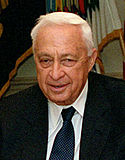Israeli prime ministerial election, 2001
|
|
||||||||||||||||
|---|---|---|---|---|---|---|---|---|---|---|---|---|---|---|---|---|
|
||||||||||||||||
|
||||||||||||||||
|
||||||||||||||||
Elections for Prime Minister were held in Israel on 6 February 2001 following the resignation of the incumbent, Labour's Ehud Barak. Barak stood for re-election against Likud's Ariel Sharon.
It was the third and last Prime Ministerial election (separate elections were scrapped before the next Knesset elections in 2003), and the only one which was not held alongside simultaneous Knesset elections.
Voter turnout was 62.3%, the lowest turnout for any national election held in Israel. The low turnout was at least partially due to many Israeli Arabs boycotting the poll in protest at the October 2000 events in which 12 Israeli Arabs were killed by the police. Other possible reasons are Sharon's massive advantage in advance polls, and the lack of enthusiasm of Barak supporters due to his perceived failings, notably, the failure of the 2000 Camp David talks with the Palestinians, and the "turbine affair" in which Barak yielded to the religious parties' pressure, violating previous promises.
In 2000, 18 years after Israel occupied Southern Lebanon in the 1982 Lebanon War, Israel unilaterally withdrew its remaining forces from the "security zone" in southern Lebanon. Several thousand members of the South Lebanon Army (and their families) left with the Israelis. The following month, the UN confirmed that Israel's force deployment was now entirely consistent with the various security council resolutions with regard to Lebanon. Lebanon claims that Israel continues to occupy Lebanese territory called "Sheba'a Farms" (however this area was governed by Syria until 1967 when Israel took control). The Sheba'a Farms dispute has provided Hezbollah with a ruse to maintain warfare with Israel. The Lebanese government, in contravention of the UN resolution, did not assert sovereignty in Southern Lebanon, which came under the control of Hezbollah.
...
Wikipedia


